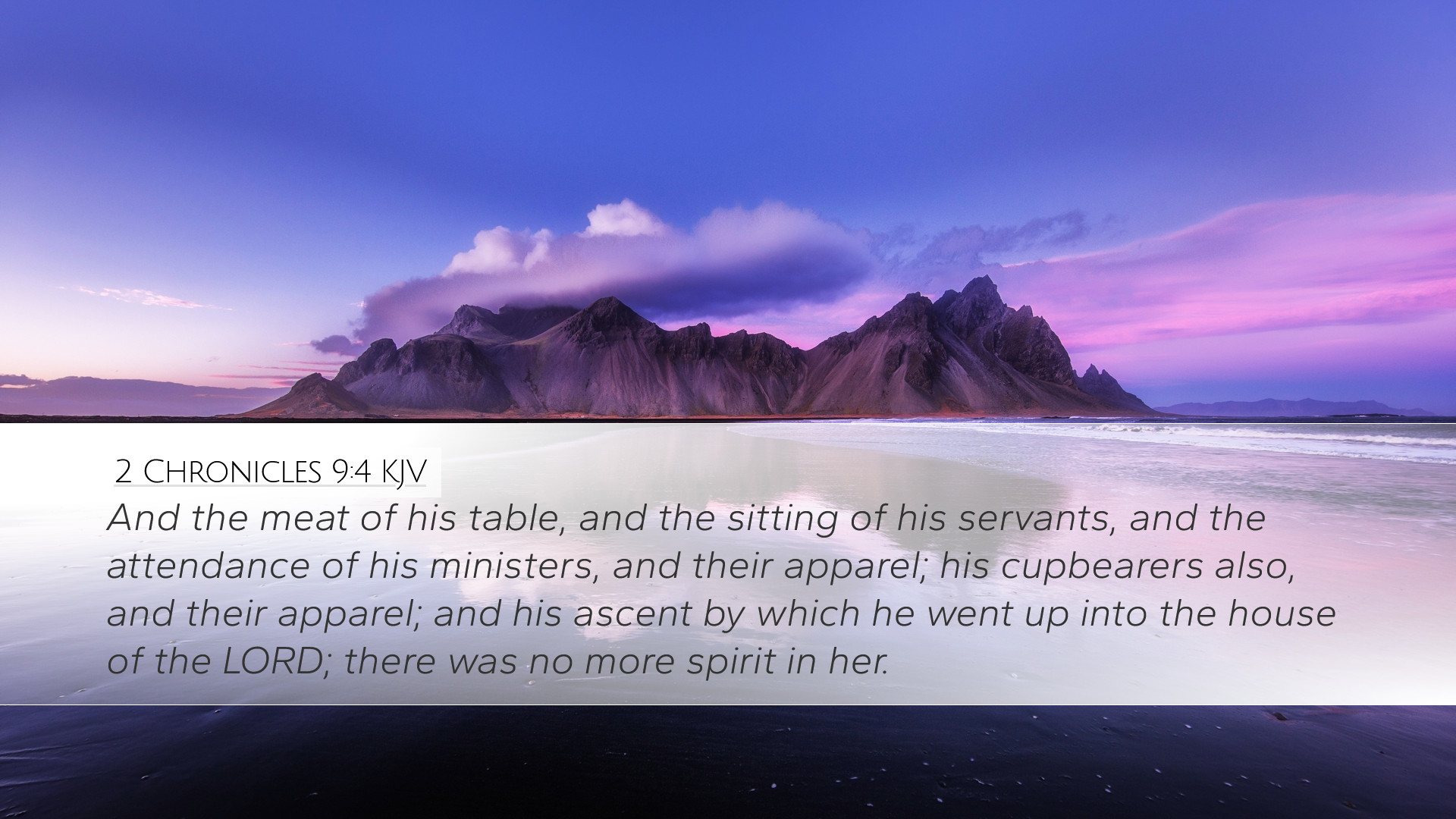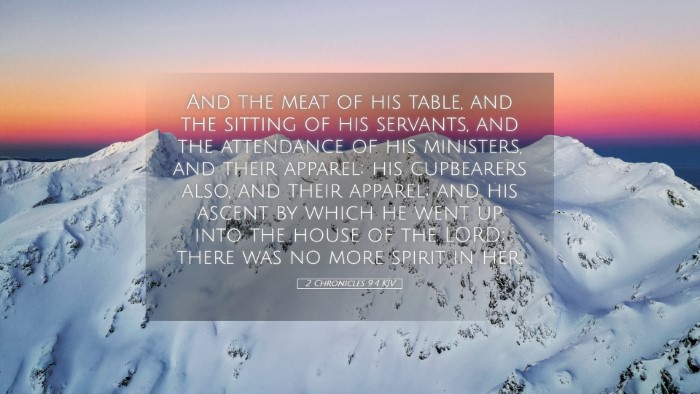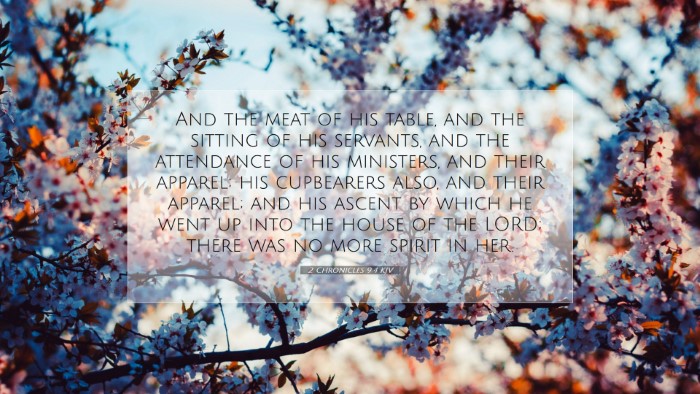Commentary on 2 Chronicles 9:4
Verse Reference: 2 Chronicles 9:4
Verse Text: "And the meat of his table, and the sitting of his servants, and the attendance of his ministers, and their apparel; his cupbearers also, and their apparel; and his ascent by which he went up unto the house of the LORD; there was no more spirit in her."
Introduction
In this verse, we see a breathtaking depiction of King Solomon's royal court, especially as it pertains to the opulence and divine order of his reign. The passage captures the awe and admiration of the Queen of Sheba as she observes the grandeur of Solomon’s kingdom and the wisdom of his administration.
Contextual Background
This account occurs in the historical context of Solomon's reign over Israel, a time recognized for its prosperity, peace, and remarkable architectural achievements, including the building of the Temple in Jerusalem. The Queen of Sheba came to assess Solomon’s wisdom and discern the divine favor he enjoyed, as well as to bring gifts to him.
Analysis of Key Elements
1. The Meat of His Table
The abundance and variety of food served at Solomon’s table reflect not only his wealth but also the blessings and provisions from God. This emphasizes the principle that true wealth includes the richness of fellowship and the sustenance given by God. Matthew Henry notes that the meal shared by the king signifies unity and peace—a significant mark of his reign.
2. The Sitting of His Servants
The arrangement and presence of his servants illustrate the hierarchical structure and order within the royal court. Albert Barnes observes that the servants’ positions indicate their importance and roles, which speak to the value Solomon placed on proper governance and the respect shown to each individual in their rightful place.
3. The Attendance of His Ministers and Their Apparel
The ministers accompanying Solomon were likely not just attendants but advisors and leaders contributing to the administration of the kingdom. Adam Clarke remarks that their fine apparel was symbolic of their role in representing the king. The beauty and quality of their clothing reflect kingly dignity and the significance of leadership in a nation.
4. The Cupbearers and Their Apparel
As cupbearers held a position of great trust in royal courts, their presence also signifies security in Solomon’s regime. The meticulous attention to their garments once again points towards the overall significance of royal decorum that Solomon maintained, as per Matthew Henry's insights.
5. His Ascent to the House of the LORD
This aspect underscores the importance Solomon placed on worship and his relationship with God. Clarke emphasizes that the manner in which he approached the house of the Lord reflects not only his humility but also his acknowledgement of divine authority and the sanctuary as the heart of his reign.
The Queen's Reaction
The concluding note about the Queen of Sheba having "no more spirit in her" highlights a profound sense of awe and perhaps even fear. This reaction showcases the overwhelming nature of the experience she had. She came seeking wisdom and found much more—she encountered an entire culture saturated with the fear of God.
Theological Implications
This verse not only details Solomon's grandeur but also elevates the understanding of how God’s blessing manifests in a culture. It serves as a stark reminder to contemporary leaders of the importance of reflecting God's kingdom standard in their affairs. The manner in which Solomon conducted his reign paints an image of integrity, wisdom, and divine favor that should be emulated.
1. Divine Wisdom
Solomon is often portrayed as the paragon of wisdom. Pastors and theologians can glean from this passage the necessity of seeking God's wisdom in leadership roles, affirming that true governance comes from a heart aligned with God's purposes.
2. The Majesty of Worship
The emphasis on worship arising from Solomon's ascent to the Temple reminds current church leaders of the primacy of worship in their ministries. Clarke encourages that worship should not merely be a function but the essence of a leader's life—drawing power and purpose from communion with God.
3. The Impact of Witness
The impacting effect of Solomon's reign on the Queen exemplifies the missional call of the church today. When the church operates in wisdom and reflects the glory of God, it can lead others to seek the same. Thus, pastors, students, and scholars are encouraged to create environments that display God's beauty and grandeur in mundane and ordinary ways.
Conclusion
2 Chronicles 9:4 acts as a testimony of God's provision and wisdom through Solomon's reign. The careful attention to detail—from the food served to the way worship was conducted—paints a holistic picture of a kingdom under divine favor. It challenges contemporary leaders to reflect on their roles and responsibilities in mirroring these values in their environments, thereby glorifying God in all aspects of life.


